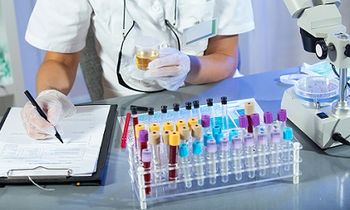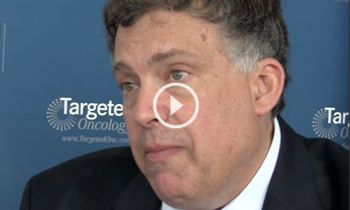
An assay that measures circulating tumor (ct) DNA in the urine can detect the early acquisition of epidermal growth factor receptor (EGFR) resistance mutations in patients with metastatic lung adenocarcinoma.

Your AI-Trained Oncology Knowledge Connection!


An assay that measures circulating tumor (ct) DNA in the urine can detect the early acquisition of epidermal growth factor receptor (EGFR) resistance mutations in patients with metastatic lung adenocarcinoma.

Roy S. Herbst, MD, PhD, Ensign Professor of Medicine (medical oncology), professor of Pharmacology, chief, Medical Oncology, Yale Cancer Center and Smilow Cancer Hospital at Yale-New Haven, associate director, Translational Research, Translational Working Group Leader, Thoracic Oncology Program, Yale Cancer Center, discusses the results of the CheckMate-057 trial, which examined nivolumab in patients with NSCLC, and possible biomarkers that could be identified.

BRCA and other mutations occurred in more than 10% of estrogen-receptor–positive/HER2-negative invasive breast cancers in a cohort of women younger than 50 years of age, according to a report at the 2015 ASCO Annual Meeting.

Veena Singh, MD, senior vice president and senior medical director, Biocept, Inc., discusses the clinical validation and utility of a liquid biopsy in non-small cell lung cancer (NSCLC) using circulating tumor cells (CTCs) and ctDNA to analyze EGFR, ALK and ROS status.

Jonathan C. Trent, MD, PhD, professor of medicine, co-director, Musculoskeletal Center, Sarcoma Medical Research Program, Sylvester Comprehensive Cancer Center, University of Miami Health System, gives an overview of the NCI Molecular Analysis for Therapy Choice Program (MATCH).

Homologous repair deficiency or a high HRD score identified triple-negative breast cancers that had an increased likelihood of pathologic complete response to chemotherapy, according to a study reported at the 2015 ASCO Annual Meeting.

A validated index for breast cancer that quantifies individual risk for late recurrence was associated with a substantial reduction in the use of adjuvant hormone therapy in a prospective study.

Low-frequency KRAS mutations are present in urine cell-free DNA in about 80% of patients with advanced cancers and BRAF V600E mutations.